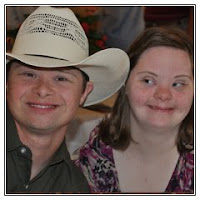A friend reminded me recently that I'd promised to blog about the workshop Jerry and I went to at the National Down Syndrome Congress meetings in Orlando.
That was the “marriage” workshop run by two sets of parents–the bride's and the groom's to be specific–with a great amount of expertise and experience. Their children were married last year in a “sacramental” rite with all the bells and whistles, and seem to be doing just fine.
Because of the danger of losing benefits should the young people have married civilly, they eschewed taking out a marriage license. If the state in which the couple resides were to declare them legally wed under common-law marriage, the state could conceivably recover benefits from them.
The notion of this is infuriating, because the benefits we are talking about here are meagre at best. Yet couples are indeed penalized for marrying while being intellectually disabled. (The state has many baffling traditions, not the least of which is periodically checking in with me to see if Kelly still has Down syndrome.)
There were lots of parents at the workshop, with lots of stories and opinions to share.
After a brief introduction and video on the wedding of their children, the group leaders opened up the discussion, and soon the discussion was all over the place. The couple in question had been married in the church but not in the eyes of the law. No problem there.
But one man objected to the notion that adults with Down syndrome should have to be married in the first place to express their sexuality, while another gave an impassioned defense of the sanctity of the union of man and woman. Most of us fell somewhere in between.
Several people wondered whether it's the marriage or the wedding the young women are after.
“Good point,” said the leader, going on to say that one acquaintance's daughter had been completely satisfied with an elaborate ceremony cementing her and her male friend as “best friends forever,” after which they happily returned to their respective group homes and evening talks on the telephone.
We have observed here at the Ranch (and our male residents have certainly lived through it) that our young women tend to be much more interested in boy-girl issues at a much younger age than the men.. This probably reflects the general cultural norm, but stands out more because our kids are so open and frank about their interests and desires.
One friend told me of her son's girl friend, who had been sneaking off to make payments on a wedding gown without her parents' knowledge. Before they discovered it she had practically paid the whole thing off! My friend's son's sole interest in marriage at this point might…only might…be the flavor of cake served at the reception.
 |
| Kelly, 12, and Sterling 11 |
Meanwhile, the couples at the Ranch are in various stages of marriage mania. For some it's clearly a fantasy, and the object of one's desire changes from week to week. But for others, there is every evidence of enduring love, deep friendship, and comfort. Kelly and Sterling have been going together since mid-high school, and they've had their rough patches but for several years now it's been pretty smooth sailing. Two other couples have been going together for a year.
So Kelly thumbs through dog-eared copies of Brides magazine and Sterling draws floor plans for their future home, which he's surprisingly good at. Casey holds relationship classes for the couples and I keep purchasing multiple copies of 101 Questions to Ask before Getting Engaged.
Most residential places just ban marriage for the residents. How they do this in good conscience I cannot fathom.
Which is not to say we've figured out how to pull this marriage thing off.
 |
| Kyle and Alaina at Special Olympics |
For one thing, we have no idea how we would house them under our current licensing. We have single-sex homes. I wouldn't have any objection to their moving into Sterling's house provided they had one side of the house to themselves, but that would mean whatever young man Kelly displaced would have to go into a women's house, and that's just not going to fly.
We can hope and pray that their HCS numbers pop up at the same time, but what are the chances of that happening? Plus, the state says we can't offer HCS services here at the Ranch so they would have to move away, which they don't want to do.
We're overdo for another heart-to-heart with Sterling's folks about the issue, and how it will all work out in the end I still don't know. We all have concerns, most having gone through divorces. We know more than we'd like about the potential difficulties as well the joys.
But in the end, the old phrase keeps coming to me: “A dream deferred is a dream denied.” And I wonder why my daughter and her fiance have to be so at the mercy of outside forces because of their disability.
Bride's gown picture from: www.aweddingidea.com/tag/gown/
